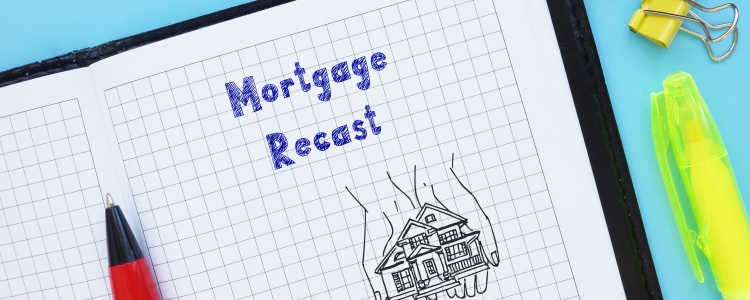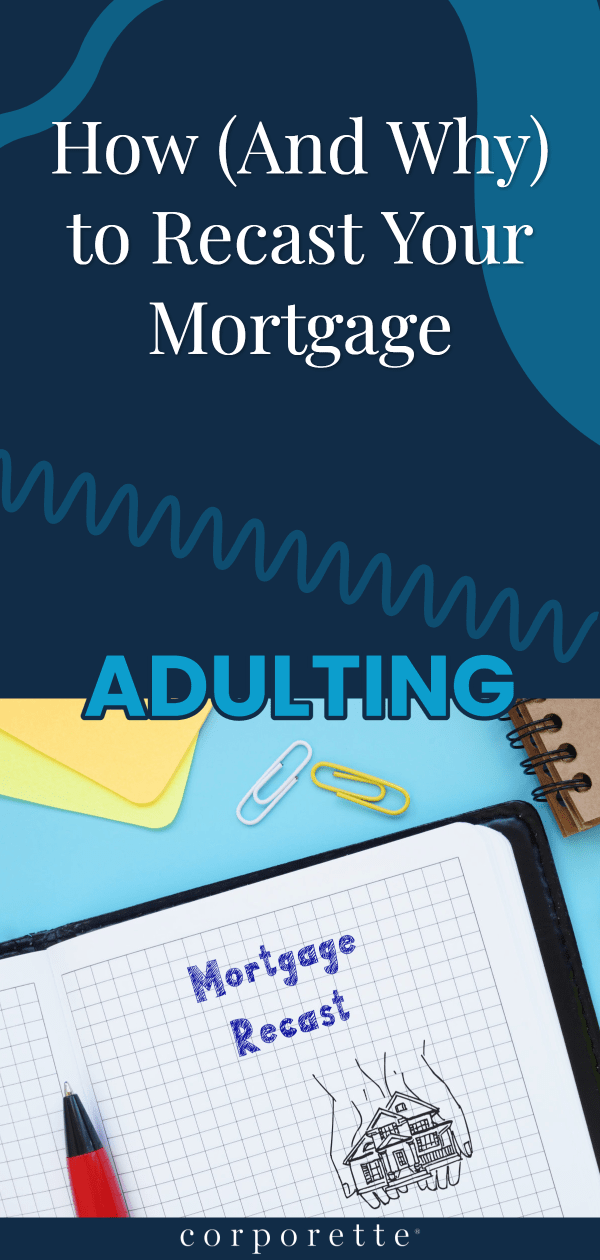This post may contain affiliate links and Corporette® may earn commissions for purchases made through links in this post. As an Amazon Associate, I earn from qualifying purchases.

Pretty much everyone who has a home loan is familiar with refinancing (and signs point to 2022 being a good year to do it), but recasting a mortgage is a less well-known option that’s worth a look, depending on your money situation. Readers were recently discussing mortgage recasting in the comments, and we thought the topic deserved its own post.
While we’ve talked a lot about home buying and mortgages over the years, recasting is something we’ve never addressed — so to learn more, we turned to Elizabeth Root, director of purchase at digital homeownership company Better, who answered all of our mortgage recasting questions via email.
Readers, have you been curious about mortgage recasting? Have you ever recast a mortgage? Have you ever refinanced?
Note: Here are a few useful online tools to crunch the numbers on your loan: a mortgage recast calculator (not very pretty, but it does the job), a general amortization calculator, and a refinance calculator.
Corporette: What does it mean to recast a mortgage?
Elizabeth Root: Recasting a mortgage is when a borrower makes a large, lump-sum payment toward the principal balance of their mortgage, and the lender, in turn, re-amortizes the loan. This means that your loan is reduced to reflect the new balance. Recasting cuts your monthly payments and the amount of interest you’ll pay over the life of the loan. However, it does not affect your interest rate or the length of your loan.
{related: when to buy a second home}
What situations make recasting a good idea, and is it ever not a smart move?
Benefits of recasting
- If your home’s value has increased recently, recasting could be a great way to lower your monthly PMI, or get rid of it altogether!
- It’s easy to do, and it’s a relatively inexpensive way to lower monthly payments if you have the cash.
- You lower your monthly payments by making one lump sum.
- You don’t have to requalify for a new loan or pay any closing costs related to refinancing.
- If you have a low-interest rate, you can keep that low rate.
Drawbacks of recasting
- You’re putting a large sum of money into equity.
- More of your cash is tied up in equity.
- It doesn’t shorten the length of your mortgage.
- If you have a high-interest rate, you keep that high rate.
- The lender will charge a fee that can be a few hundred dollars.
- Not all servicers will allow for recasting. Oftentimes they will specify the minimum amount that you must pay toward your principal in order to recast. This amount can vary, but may be between $5,000–$10,000.
{related: buying a home: tips and tricks}
If you’re deciding between refinancing and recasting, what are the factors to consider?
With recasting, you’re keeping your existing loan and only adjusting the amortization. You cannot get a lower interest rate with recasting. This is great if your interest rate is already low. With a refinancing, you apply for a brand-new loan and the fees that go with it. Because you end up with a new mortgage with refinancing, you get a new, lower interest rate. This is great for homeowners with high interest rates.
Keep in mind if you already have a fixed-rate mortgage with a low interest rate, then a refi might not be beneficial. But, if you have a low-interest, fixed-rate mortgage and want lower monthly payments, then a recast might be a good option.
{related: paying down debt vs. saving}
Would it ever be better to pay extra on the principal every month rather than recast your mortgage?
There are benefits to paying extra on the principal every month. You’ll save thousands of dollars in interest payments and have financial freedom earlier. However, if you have other debt, you may not want to pay extra towards the principal. Mortgage debt almost always has a lower interest rate than any other debt, so it costs you a lot less to hang onto it.
Also, if you’re not saving money for retirement, your extra cash will likely do you more good if you’re investing it or saving it than if you’re paying off a low-interest mortgage or putting it towards a recast. Furthermore, emergencies pop up. It’s a smart idea to have cash saved up to cover these inevitable expenses such as unplanned medical or car bills. If putting more money towards your mortgage, whether extra payments or recasting, means that you don’t have any cash saved up, you’ll likely have to take on high-interest debt to cover such emergency expenses.
Readers who own a home, we’d love to hear your experiences: Have you ever recast a mortgage? How much was your lump sum payment, and how did your monthly payment change? Have you ever refinanced instead of recasting?
Stock photo via Deposit Photos / rummess.



Anon
I’ve never heard of recasting…interesting. I’ll need to read up more, but I’m not seeing a big benefit compared to just setting aside extra for principal payments, assuming the loan allows them (which you should find out before you sign).
Sunshine
I’ve never heard of it. But the part that stood out to me as the biggest benefit is getting out of PMI.
Anonymous
The benefit is that once you recast you have a lower payment forever.
Anonymous
Slightly on topic– My husband and I are finally ready to buy our first house in about 6-10 months from now. (We have a baby coming in April and would like to buy about 3-6 months after baby is born). How do you REALLY know how much house you can afford? By looking online different sites tell me I can afford wildly different amounts. And when should we start looking for a real estate agent and lender?
Anon
You have to look at the house and associated costs – insurance, HOA type fees, property taxes, local income taxes, etc. I think people tend to target a price range before considering that a $500k house in one municipality could cost you an extra $1k a month more than a similar one in a neighboring municipality. I would decide what you want your max payment to be and work backwards to see what prices that may translate into.
Anon
Also, you may not fully feel the impact of childcare costs within 6 months of childbirth. You need to have a very good sense of how these and other real costs of child rearing will affect both your budget and your feeling of financial security. A well-paying, demanding job that feels great now may no longer seem like where you want to stay. All of this is just to say that you will be experiencing a ton of change, and this could decrease what seems affordable.
L
I actually did this recently. My husband and I had been looking to sell our house and buy a cheaper one, since our mortgage payment was increasing too fast (increasing house value and property taxes). Based on the crazy state of the market, we had to buy a new house before selling because things were so competitive. One we purchased the new house and completed the sale of the old one, we recasted the mortgage on our new house using the sales proceeds. The recast amount was over 30% of the loan balance, so our monthly payment decreased by over $700. While there are valid arguments about investing that money, we needed our monthly mortgage payment to be under a certain amount, so it worked for us. Our current mortgage company had a weird recast process where you have to wire money to them before they send you the paperwork letting you know what your new monthly payment will be, but since we’d already done the basic calculations, it ended up being fine.
PLB
How large must the lump sum payment be in order to recast the mortgage?
AZCPA
That totally depends on your lender. Many lenders (like my current one) won’t do this at all. My prior lender (a credit union) would do it once over the life of the loan. They would do it on as little as a $10k lump sum payment, but since you could only do it once, it made sense to either wait until you’d paid down quite a bit, or made a significant lump sum payment.
PLB
Thank you! Not in a position to do this now but I could see doing this in the future for sure.
AZCPA
That totally depends on your lender. Many lenders (like my current one) won’t do this at all. My prior lender (a credit union) would do it once over the life of the loan. They would do it on as little as a $10k lump sum payment, but since you could only do it once, it made sense to either wait until you’d paid down quite a bit, or made a significant lump sum payment.
AZCPA
Ugh, no clue how that double posted!
Notinlaw
We did this. Bought a house, moved, then prep’ed/sold old house. Someone asked at some point what we were planning to do with the proceeds from the old house. It was the first that we had heard of recasting. What we learned was that to reduce the monthly payment, we would need to ask for a recast. Otherwise, we would continue to make the larger monthly payments and the mortgage would eventually pay off more quickly. So, whether you do it or not depends on what you want to achieve.
Simone
Another option is to ask if your lender will do a “loan modification.” We just did this last fall and it was very easy. Basically, a modification lowers the interest rate on your current loan but keeps the other loan terms in place (still the same amount of years to pay it off, etc). But, the lower rate means you have lower monthly payments going forward for the life of the loan. To do a modification to a lower interest rate, we just had to pay a fee equal to 0.5% of the current loan balance. To get the modification I just called my lender (a Government agency credit union) and said we were thinking about refinancing with another company to get a lower rate but would really prefer to stay with them and asked if they’d do a modification in order to keep us. They agreed quickly. So, it can’t hurt to ask your lender. It was so much cheaper and easier than doing a refinance!